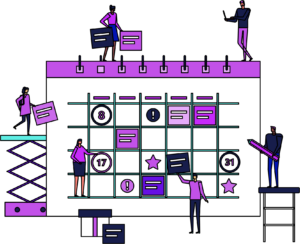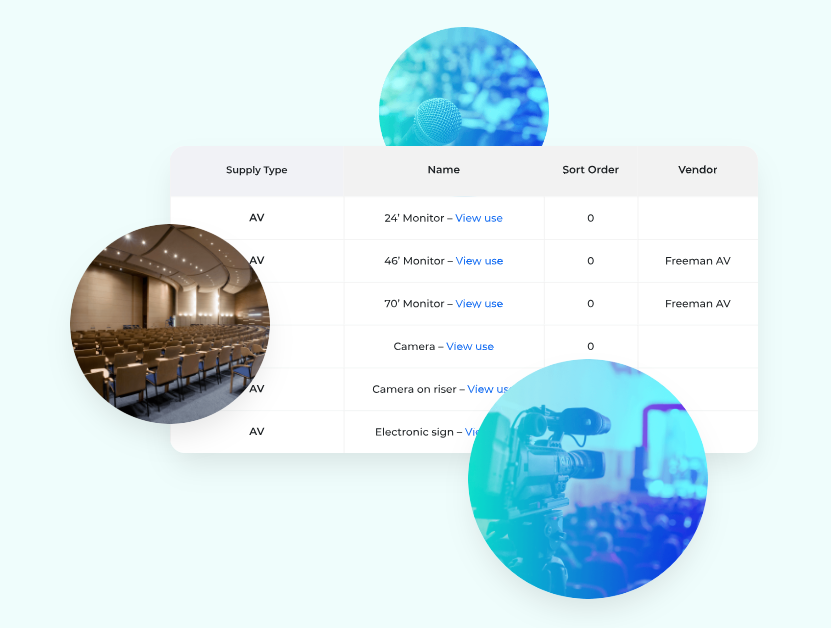Understanding Conference Budget Planning
Tasked with planning a successful conference, event planners and organizers must be ever mindful of their conference planning budgets. In order to ensure that all aspects of the event and event budget are well-managed, financial consideration must be prioritized throughout the planning and execution of a conference. A high-quality event experience is typically the result of a well-designed and well-respected budget, from start to finish.
Like most tricky tasks, budgeting for your conference might sound easier said than done. After all, some of the key components include the biggest and certainly most visible factors of any event, such as the venue, catering, and marketing initiatives.
By understanding how to plan a conference, including conference budget basics, event planners can set appropriate priorities aligned with financial goals and realities. In this article, we offer insights into the various cost factors that must be considered, along with tips for optimizing expenses, and strategies to allocate resources efficiently.
Pro-tip:
Don’t miss our free downloadable conference budget planning template.
Here’s a step-by-step guide to creating conference planning budgets.
Step 1: Conducting a Needs Assessment
To allocate resources effectively and efficiently, event planners must identify conference objectives and scope with a surgical-like precision. Start by considering the purpose of the conference and then evaluate how to magnify those objectives for a larger audience.
How large? Great question!
We’ll spare you the size matters joke, but seriously, when it comes to conference budgeting, there is a world of difference between planning large-scale vs. small-scale events.
Estimating conference attendance and participant demographics is central to effective budgeting. Determine your target registration goal and go from there. Be sure to factor in a little wiggle room as the number of expected attendees will guide your decisions on those big-ticket items like catering and event space.
Also important is the length of your event, along with the schedule, which will include keynote speakers, sessions, workshops, networking opportunities, and possibly social gatherings as well. All these activities will impact your budget and need to be allocated for, accordingly.
While determining the event duration and schedule are also important factors, make sure to zoom in on seemingly smaller, yet critical, details. For instance, does your venue fee include the availability of audiovisual equipment? If not, you’ll need to account for that, especially in light of speaker expectations and session needs
Regarding speakers, there is nothing quite so valuable to an event as an engaging keynote speaker… and nothing quite so costly, depending on the name and persona. Speaker costs have caught some of our clients by surprise, which is why it’s worth noting the massive discrepancy between speaker fees.
As a general rule, when it comes to sourcing and booking a speaker for your event, keep in mind that the cost can range anywhere from nothing at all — some speakers will appear pro bono, but more likely will charge between $5K upwards of $100K. Establishing and sticking to your speaker budget is non-negotiable for fiscal success.
Similarly, certain types of conferences are associated with specific costs that also must be taken into account. For instance, conference planners tasked with managing CME events must factor in the cost of issuing CME credits. 
Nonprofit events also present nuanced considerations with respect to the role of fundraising, such as:
For non-profit organizations to maintain long-term support, it is important to continue pursuing opportunities to not only meet new people but connect with new businesses as well. It is becoming increasingly common for businesses to implement some sort of corporate philanthropy into their annual budget that can be used to support non-profit organizations in the area.
Completing a needs assessment includes identifying common and unique costs, along with industry-specific opportunities, like the above-stated fundraising for nonprofits.
Ultimately, an impactful needs assessment offers a macro view of your conference plan in order to develop a strong strategy for execution.
Step 2: Researching and Allocating Costs to Your Budget for Conference Planning
With your needs assessment completed, it’s time to get into the micro details, the nitty-gritty, and research the specific costs for different conference elements. During this process, event planners should be mindful of fixed versus variable costs.
Fixed costs are easier to account for as they don’t change. For instance, the venue rental will be a fixed cost; in other words, the fee will not fluctuate due to attendance. What will fluctuate, however, are variable costs like catering, the total of which is associated with attendee numbers. Catering an event for 50 people will be less costly than an event for 250 people. Sounds simple, but failing to plan for these budget variables can cost you in the end.
Quite literally.
Just as everyone is advised to have a personal savings account that can cover six months of expenses, allocating a contingency fund for any unexpected expense will make your budget nearly impossible to break.
Like any financial planning, event planners will likely have to make decisions to accommodate event wants versus needs and ensure budget alignment. The best way to do this is prioritize those expenses that are most important or will likely make the biggest impact. These will probably be a mix of both fixed and variable expenditures.
To make these decisions so that event priorities are covered, event organizers should keep the purpose and scope of the event always at the forefront of their efforts. Once priorities are covered, it’s important to allocate funds for marketing, logistics, and contingency.
A great way to home in and strengthen your budget is to find some allies in other industries. Get to know your suppliers and vendors and remember, repeat business or income they can count on from upcoming or annual events benefits them, just as much as their reliable product or service benefits you.
Step 3: Negotiating with Suppliers and Vendors
When creating your conference budget, you want to strike the balance between sourcing the very best suppliers and vendors while ensuring you can afford them. To negotiate the most favorable contracts and rates, time and effort must be dedicated to research of specific vendors relative to industry standards. Without having a ballpark picture of reasonable rates, you’ll find yourself negotiating blind.
Communicating your specific goals and objectives will help each supplier present the most accurate estimates. During these conversations, effective event managers will inquire about available discounts or value-added services. Part of these negotiations, when done with transparency and mutual respect, should aim to establish strong partnerships upon which to build even better events down the road.
Fostering these partnerships is a smart event planning strategy, one that can even support contingency plans for future conferences.
Why Creating a Contingency Plan is Vital
We’ve all been told to “expect the unexpected” and when it comes to planning your conference budget, these wise words can’t be overstated. No matter how much time and effort was invested in creating a conference budget, event planners feel most confident in the knowledge that they have allocated a contingency budget for unexpected expenses.
While the exact percentage of the budget allocated to unforeseen circumstances will vary and depend on the complexity of the conference, a typical estimate is anywhere between 5-10% of the overall conference budget.
Strategies for managing unforeseen challenges without exceeding the budget start with establishing a solid event plan in the first place. Part of that plan should include a clear understanding of potential challenges in the name of risk management. This should allow for the ability to reallocate resources when necessary. Better yet, consulting and problem-solving with conference stakeholders can also help mitigate issues as, or even before, they arise.
A flexible approach to project management can also reduce a seemingly large challenge to a minor inconvenience. And remember those vendor partnerships? Nurturing those relationships can prove invaluable in the face of an issue, as suppliers might accommodate a change in their order or contract in order to keep you afloat and moving in the right direction.
Of course, emergencies by definition do not come with a warning; however, keeping a close eye on a conference plan as it unfolds should help head off any major trouble before it begins. Managing a conference is not a set it and forget it kind of endeavor. Monitor progress and developments as they unfold to problem solve for any potential setbacks.
As with all successful conference management, future success depends on documentation. Take note of what’s working and also what went wrong in order to safeguard against any stressful situations in the future.
Take charge of your conference planning budget 
Hosting a conference is rife with responsibilities and details; from managing your event content to strategizing for real and imagined situations, conference planning can be complicated, especially without the right tool
That’s why you might include technology integration into your budget, specifically a conference planning tool that can take much of the weight off your shoulders. The benefits of using an event content management tool are many, and include convenience, cost-effectiveness, efficiency, and the preservation of resources.
If your budget doesn’t allow for the game-changing capabilities afforded by proven event management solutions, you can always explore sponsorships to cover the cost of a mobile event app.
Before your vendors and suppliers, you might first consider partnering with Attendee Interactive to streamline and automate processes, including your budget for conference planning.
Contact us today to get started!
Creating a Conference Budget: Frequently Asked Questions (FAQs)
1. How can Attendee Interactive assist in budgeting for a conference?
By streamlining and supporting all of your event content on a single robust platform, Attendee Interactive makes it possible to create and commit to a budget, as well as communicate those fiscal expectations to your team and, if necessary, other event stakeholders.
2. What are the typical cost components to consider in a conference budget?
While exact cost components will vary from one conference to another, especially depending on event size and scope, event planners should consider the following fixed and variable costs, at minimum: venue, catering and hospitality, marketing, keynote speakers, audio visual and event technology.
3. How can I estimate attendance and participant demographics effectively?
To start, event planners must define their target audience and conduct market research to gain valuable insights about their ideal attendees. Reviewing historical data from past events is also valuable, as is diving deeper into the demographics of early registrants. Integrating registration tiers is another effective strategy, along with social media monitoring and the use of web analytics tools.
4. What negotiation strategies can help in securing cost-effective contracts with vendors?
Researching industry standards, along with specific vendors and their area competitors will give you insights into fair rates and fees. Soliciting multiple bids can also help you familiarize yourself with the options available and potentially lead to vendors offering discounts, add-on services, or value packages. Investing time to clearly and respectfully communicate and learn about a vendor can help nurture a relationship that could prove mutually beneficial in the long term.
5. How does Attendee Interactive help in contingency planning for conferences?
By empowering event planners with up-to-date and accurate information like attendee tracking, including early registration and session selections, event planners have a clearer picture than ever before when it comes to event realities, expectations, and goals. These insights make it possible to anticipate and respond to unforeseen events and variable expenditures before they become challenges that could compromise the success of a conference.




